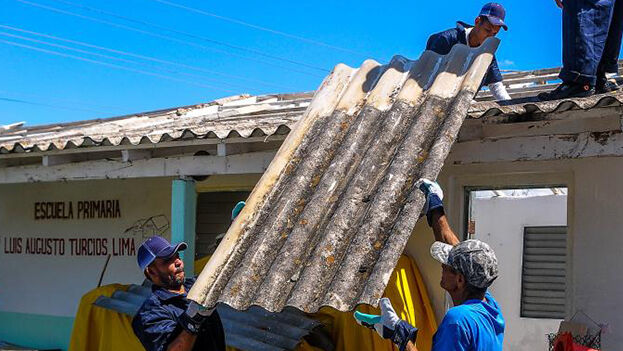
![]() 14ymedio, Havana, 1 November 2022 — The threat launched by the Cuban Government against “illegalities, corruption and indiscipline” has had little impact on the informal market of Pinar del Río. A Facebook message on Monday proposing the sale of construction supplies that the authorities reserved for victims of Hurricane Ian received a challenge: “I have tiles for sale privately, call me.”
14ymedio, Havana, 1 November 2022 — The threat launched by the Cuban Government against “illegalities, corruption and indiscipline” has had little impact on the informal market of Pinar del Río. A Facebook message on Monday proposing the sale of construction supplies that the authorities reserved for victims of Hurricane Ian received a challenge: “I have tiles for sale privately, call me.”
The “tiles,” actually temporary zinc plates, were marketed through the Ventas Pinar group, where hardware products, household supplies, cell phones, clothing and food — shrimp, cookies, coffee — are in high demand but scarce in state stores.
More than a month after the scourge of Hurricane Ian, work to rebuild the damaged infrastructure is progressing slowly due to the shortage of construction products on the Island. In Pinar del Río, the area most devastated by the climate event, there are still more than 108,000 unrepaired homes, according to the official newspaper Granma, which reacted with alarm to see that the few materials provided by the Government had already appeared in the informal market.
“Unfortunately, this isn’t an isolated case. On the site itself, and on others that have proliferated taking advantage of the expansion of Internet access, offers of all kinds of goods of ’doubtful’ origin have become commonplace for years, in sight of everyone who wants to look,” says the newspaper.
The newspaper gives the example that even induction cookers, which are sold in a regulated manner in the pinareña province for families who have been left without equipment, can be found in Facebook or WhatsApp groups at prices six times higher than the official value, about 20,000 pesos.
The harsh government warnings against the black market “do not seem to change” social media sales groups, recognizes the newspaper, which admits that, by informal means, “the most diverse assortments can be obtained, the result of corruption, lack of scruples and lawlessness.”
The shortage of food and basic products on the Island causes distortions that contribute to fueling illicit trade, through which electronic items as well as medicines can be accessed, but at exorbitant prices. Miguel Díaz-Canel has recognized that this happens “in plain sight” of his administration and the Communist Party.
In that sense, in recent days, several operations have been carried out against the informal market and traders who sell their products at prices above the fixed prices. Last week, the Municipal Inspection Directorate (DIM) in the Havana municipality of Playa imposed fines of up to 8,000 pesos on sellers who offered a pound of tomatoes, peppers and carrots at a price of up to 300 pesos.
The Government of Havana also reported that it imposed fines of up to 8,000 pesos on two bakeries in Ciudad Libertad, a neighborhood of the Havana municipality, after it was detected that they sold the standard bread with a weight below that established in the technical quality standards. In another operation in the Lido neighborhood, the inspectors confiscated from sellers several products from the basic basket [ed. note: i.e. the rationed goods allocated to each individual/family] that, the municipal government said, will be delivered to social institutions.
Translated by Regina Anavy
____________
COLLABORATE WITH OUR WORK: The 14ymedio team is committed to practicing serious journalism that reflects Cuba’s reality in all its depth. Thank you for joining us on this long journey. We invite you to continue supporting us by becoming a member of 14ymedio now. Together we can continue transforming journalism in Cuba.
